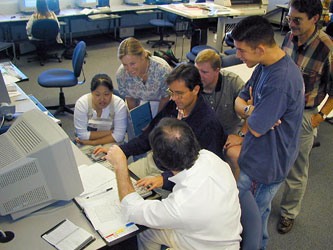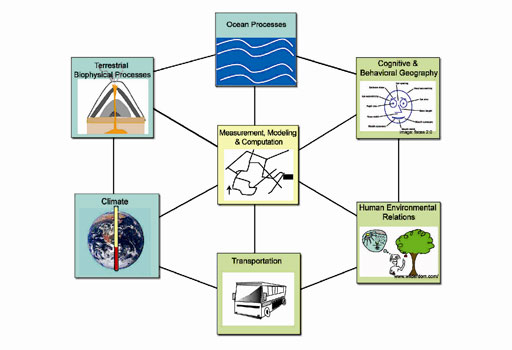“When I declared Geography several years ago, not only did I feel I had found my academic calling, but that I had discovered part of myself as well. I’ve loved working in a field where the main counterparts are the understanding of human and environment processes, the use of cutting-edge technology, and the endless possibilities for creative implementation of these tools in worldwide issues” (Laura Harrison, Geography major).
Are you interested in one or more of the following? •Atmospheric Sciences • Civil & Environmental Engineering •Computer Science (including Databases/Information Systems & Graphics/Human Computer Interfaces) • Earth Sciences (including Environmental Sciences, & Soil Science) • Forestry & Forest Sciences • Information Science • Meteorology • Oceanography • Operations Research, Systems Engineering, & Industrial Engineering • Psychology (including Cognition & Perception) • Sociology (including Demography, Population, & Ecology as well as Place and Environment) • Statistics & Probability • Urban Studies & Planning
If you said yes, then you’re a candidate for a major in GEOGRAPHY!
Geography is the most interdisciplinary department on the UCSB campus and is best represented by three cross-cutting themes:
Earth System Science (ESS): This systematic area emphasizes the measurement, analysis, and modeling of hydrologic, atmospheric, oceanic, and terrestrial systems and the interactions between systems. A large proportion of the problems addressed by researchers in ESS involve three common elements: large regional issues; mathematical and computational modeling; and large, spatially-indexed datasets.
Human-environment Relations (HER): This systematic area covers the major components of Human Geography offered by the Department, including: human spatial behavior; spatial decision making and decision support; spatial and geographic cognition; urban and regional modeling, planning, and policy; human movement and transportation systems; resource and environmental management; environmental ethics; human response to the changing environment.
Modeling, Measurement and Computation (MMC): This area is the investigation of those sets of techniques from the areas of analysis, statistics and computation that are particularly well-suited to the modeling of the complex, geographic phenomena that are the subject of investigation in both ESS and HER. Important sub-areas include numerical modeling, spatial statistics, remote sensing, computational modeling and database systems (including GIS) and visualization, all of which are increasingly dependent on knowledge of computational theory and practice.
Within and cutting across these three broad conceptual categories, the Department of Geography has seven specific fields of strength: 1) measurement, modeling, and computation; 2) the geography of transportation; 3) human-environmental relations; 4) ocean processes; 5) terrestrial processes; 6} climate; and 7) cognitive and behavioral geography. Each field is covered by several faculty, plus affiliates, emeriti, and interdisciplinary units and cross-appointments. All of our faculty members have expertise that transcends any single field, thus providing cohesive linkages.
In each of these fields, the UCSB Department of Geography provides national leadership. Indeed, the National Research Council ranked our Department number four in the nation in 1995—the highest NRC ranking of any department on the UCSB campus—and we expect to be ranked number one when the next NRC rankings are released in 2007. We currently have 5 Assistant Professors, 2 Associate Professors, and 16 Full Professors in the following fields:• Climate: Gautier, Michaelsen• Cognitive & Behavioral Geography: Golledge, Montello, Raubal• Human Environmental Relations: Carr, Couclelis, Eakin, Schneider, Sweeney • Measurement, Modeling, and Computation: Clarke, Goodchild, Kyriakidis, T. Smith • Ocean Processes: Dickey, Siegel, Washburn • Terrestrial Biophysical Processes: Chadwick, Loaiciga, Roberts, Still • Transportation: Church, Goulias
Our faculty members are nationally and internationally renowned for their expertise. For example, Goodchild, Clarke, Chadwick, Siegel, Roberts, and others have participated heavily at NASA and the National Research Council; Goodchild named the discipline of GIScience; Golledge is widely acknowledged as a founder of behavioral geography, but also has considerable strength in transportation research; Dickey (and associated faculty members Tom Dunne and Jeff Dozier at Bren) are Fellows of the American Geophysical Union; Michaelsen heads the UCSB branch of the internationally renowned Climate Hazard Group; Church developed software for scheduling systems for manpower deployment and training that is now used by the US NAVY, the German Air Force, and the Australian Army; Gautier developed award winning education software for K-12; Goulias provides transportation engineering and planning consulting services to State/Federal agencies and International organizations and firms; and the list goes on. Not surprisingly, the Department boasts three members of the National Academy of Sciences, three members of the American Academy of Arts and Sciences, and numerous recipients of other major academic awards and honors.The Department of Geography also happens to be at the top of the scale as far as funded research support is concerned. Over the past six years, the Geography faculty has been awarded approximately a total of $48,746,860 or about $350,000 per each full time faculty member per year—in other words, each UCSB Geography faculty member raises almost $1000 a day in research funding, probably the highest amount of research funding of any Department of Geography in the United States!
Geography majors are among the most marketable of all majors, according to placement counselors. As the Association of American Geographers Career Guide points out, Geography’s theories and methods provide analytical techniques applicable to a wide range of questions asked over a broad spectrum of occupations. For students planning to end their formal education with the bachelor’s degree, a major in Geography provides marketable skills and the broad perspectives on environment and society that enable graduates to move beyond entry-level positions. Geography also provides a sound foundation for students who plan to enter graduate work in a variety of fields, from geography and the physical sciences to business, land use planning, law, and medicine. Geography majors find work as public sector transportation planners; environmental impact analysts; airline route specialists; import / export and shipping logistics planners; geodemographic analysts and marketers; strategic planners in banking, insurance, and real estate; software developers; web designers and programmers; urban and regional planners; computer cartographers using Geographic Information Systems; international trade consultants; teachers at all levels; and much, much more.
Still interested? Stop by and talk to our Undergraduate Advisor, Laura Harrison (3611 Ellison Hall; harrison@geog.ucsb.edu). As Laura puts it, “Next to studying Geography, my second favorite thing is talking about Geography, so come on by and say hello!”



